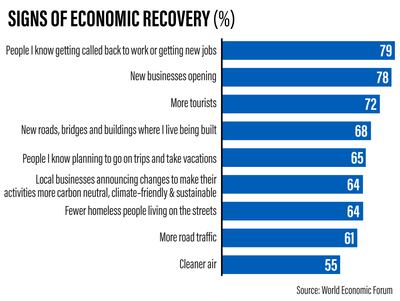Three in four adults globally believe it will take at least two more years for their country’s economy to recover from the Covid-19 pandemic, according to a new poll.
A majority of adults expect businesses and governments to share the responsibility of economic recovery, according to the findings of an Ipsos survey commissioned by the World Economic Forum. It polled 22,000 people aged 18 to 74 in 29 countries between June 25 and July 9 this year.
The respondents were asked whether their economies had already recovered from the pandemic or how long they thought it would take for it to do so.
The Covid-19 pandemic tipped the world economy last year into its worst recession since the Great Depression, forcing countries into lockdowns that led to higher unemployment, reduced salaries and businesses to close, according to the International Monetary Fund.
The IMF maintained its global economic forecast at 6 per cent in July but downgraded its growth outlook for emerging markets and developing economies owing to the uneven access to vaccines and the emergence of Covid-19 variants that are hindering the shape of recovery.
managing director, World Economic Forum
“The world is at a global turning point where leaders must co-operate, innovate and secure a robust recovery,” said Sarita Nayyar, managing director of the WEF.
“Corporations have a responsibility to work with governments and civil society to address the big global challenges while protecting public health and growth. ESG [environmental, social and corporate governance] reporting metrics, investments in green finance and building more inclusive workplaces are promising first steps forward.”

Jobs, new businesses opening and an increase in tourism are the top three signs of economic recovery, followed by infrastructure and social changes, according to the Ipsos survey.
Only 7 per cent of those polled believe their country’s economy has already recovered, the study found. This view is most prevalent in China (56 per cent) and Saudi Arabia (25 per cent).
About 19 per cent of people believe their economy will recover in a year – this is especially true in Saudi Arabia (38 per cent), the US (32 per cent) and South Korea (31 per cent), according to the survey results.
Meanwhile, 35 per cent of those polled said it will take their country’s economy two or three years to recover. This includes respondents in Japan (52 per cent), Chile (46 per cent), Italy and Malaysia (both 44 per cent), and the Netherlands (42 per cent), the WEF said.
However, nearly 39 per cent estimate that it will take their economy more than three years to recover from the pandemic, with those in Russia (66 per cent), South Africa (62 per cent), Argentina (59 per cent) and Romania (58 per cent) most likely to hold this view, according to the WEF.
The majority of the global public expects government and businesses to lead the economic recovery. Globally, 53 per cent of those polled said it is the government’s responsibility and 52 per cent said large multinational businesses must take the onus of economic recovery, the research found.
“In addition to fostering social cohesion, advocating for human rights and providing community assistance, civil society plays a crucial role in promoting a sustainable and equitable recovery and creating an enabling environment in collaboration with business and government,” said David Sangokoya, head of civil society and social justice at the WEF.
“As the world faces three critical crises in the Covid-19 pandemic, climate change and systemic inequalities, the inclusion of civil society in the world’s efforts is necessary to ensure transparency, accountability and impact for communities bearing the brunt of these crises.”


